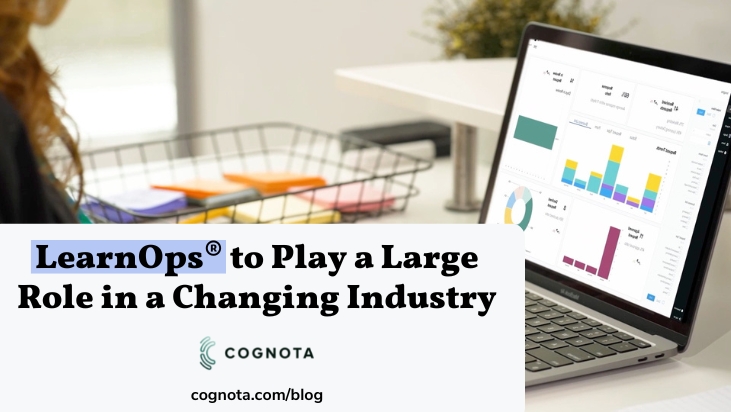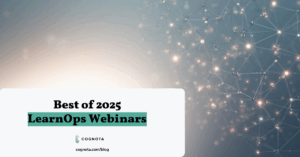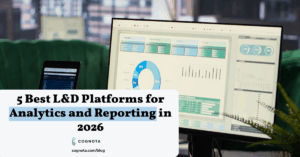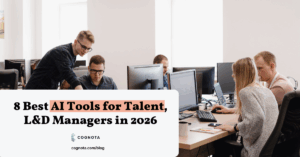A webinar held recently entitled “2023 L&D Industry Outlook” sought to discuss L&D challenges in a deeper context, as viewed by different stakeholders in the industry.
Hosted by Ryan Austin, founder and CEO of Cognota, and moderated by Debbie Richards, Chief Technology Officer of Creative Interactive Ideas, webinar participants also included:
- Michael Rochelle, Chief Strategy Officer and Principal HCM Analyst at industry research firm Brandon Hall Group
- Sanket Merchant, Partner and Lead Investor in Peakspan Capital
- Michele Rucchiuto, Global L&D Director for Allstate
Check out the full recording of the session on demand.
Outside pressures and volatility
The conversation kicked off with perspectives on the market, especially revolving around the idea of volatility. In a discussion about the current uncertainty in the markets, which ultimately affects the operations of any business, it was noted that L&D itself will not be volatile, but the true test will be how L&D reacts to the volatility of the business and to market forces.
The current state of hybrid work places a lot of pressure on learning and development organizations that, unfortunately, are accustomed to straight-line processes. This works during periods of predictability, but timelines have become abbreviated while at the same time, learning teams need time to develop new competencies and skills in employees or develop their career paths.
“Stability and time are needed to give people that opportunity to change the way they think and act,” explained Rochelle. “It’s going to be a real challenge to get that level of stability, especially for businesses that are always in flux.”
Investors weighing in
Sanket Merchant of Peakspan Capital went on to discuss the economic outlook and the idea of a potential recession this year.
“One of the things that I framed with our portfolio companies, including our companies that are sitting in the human capital management arena, is that we’re shifting from a world of abundance to one of constraints,” Merchant noted. “Many learning development leaders are going to be experiencing a ton of pressure from their peers, workforce, and shareholders to drive more value and impact under a new operating model for 2023.”
Merchant believes that CFOs and procurement teams are going to be more critical than ever when it comes to spending, and delivering a strong ROI case for any software company is going to be table stakes.
Because of stronger expectations on innovation and growth, the question really comes through, ‘How can you do more with less?’ Nonetheless, Merchant sees human capital optimization as an area that could see growth despite some of the headwinds expected across the market.
Affecting the enterprise—and budgets
If L&D leaders are not being asked to reinvent their operating models today, they will be asked to do this in the near future. Learning teams are being asked to think and work differently, collaborate faster and more efficiently, and to deliver more value.
Digital transformation, which accelerated under the pandemic, and an uncertain economic environment, are putting cost pressures on the entire organization, including the L&D function, which is now getting a closer look.
“L&D has really been asked to ruthlessly prioritize its most important work, which means looking at how we operate and making sure that we’re efficient,” noted Rucchiuto. “We’re adjusting not only how we work but how we’re structured. We’re being asked to focus on the highest-value work, create efficiencies, and, in some cases, rationalize redundancies, especially related to tech spend—anything that’ll make us leaner, faster, more focused and, ultimately, able to deliver more value.”
Rucchiuto went on to point out that there is now more of an overall openness to look at new ways of working, collaborating, and experimentation—an art of what’s possible. She has observed investments in technologies and practices that enable these preferred processes, despite the headwinds that are ahead.
What 2023 will have in store
In 2023, L&D will finally get on the same page as the business.
“Some people can look at learning and development as a hum in the boiler room. As long as a hum sounds the same, no one is expecting more out of it,” notes Rochelle of Brandon Hall Group. “I think this is the opportunity for L&D to ask, ‘Do I really want to fight for that strategic seat at the table?’”
L&D needs to be more than just a corporate services function right now. The department must go farther and correlate any percent increase in revenue, customer satisfaction, or risk mitigation with their efforts in order to demonstrate the direct impact that the learning function had on that happening across the organization.
Though nothing new—yet also a big opportunity— the ongoing challenge of showing the business impact and the ROI of learning remains. As a corporate service, L&D must speak the same language as the rest of the company, including metrics and impact.
“If we don’t do that, we’re always going to be one step ahead of being outsourced,” notes Rochelle.
Sanket notes that we are shifting towards a skills fulfillment model, where we ask about the current state of skills and then how to leverage the tools that are available to drive skills density across the organization. Learning leaders are doing more with less and meeting learners where they are at. Sanket points out that he is seeing this in organizations of all sizes, from the Fortune 500 to start-ups in scaling mode.
Trends for CLOs
Ironically, CLOs by and large do not describe “learning” as their #1 priority. Instead, their number one role in an organization is to improve the capacity of talent, with learning as the vehicle to do that, notes Rochelle.
A CLO’s “end goal is to deliver the right people in the right place doing the right things in the right way for the business,” he explained. “That’s my ultimate goal: to improve the talent capacity and the readiness of talent”
Here are some other CLO trends:
A talent development organization
Learning also has to have a performance outcome. CLOs need to ask themselves, “How do I bake in learning and make it meaningful?”
They need to find ways to connect it to individual development plans, such as rewarding and recognizing learners, from meeting a certain objective and showing how to advance their personal and professional goals.
It’s no longer a learning organization; instead, it’s a talent development organization. As such, learning and talent cannot continue to be separate, siloed organization.
Chief Retention Officer
One of the reasons for the Great Resignation is that employees were quitting because they felt that they just weren’t learning much on the job anymore. As such, CLOs also need to realize that learning is more than just getting people trained.
“The Chief Learning Officer is now the Chief Retention Officer,” explains Rochelle, “If I’m not a learning-focused organization driving a learning culture, I am contributing directly to the voluntary and involuntary turnover of my organization and I should get fired.”
Upskilling and reskilling still a priority
Organizations are all trying to compete in the marketplace and CLOs must ensure that employees have skills not only for today but also for tomorrow.
“Good investments are anything to do with upskilling and reskilling, which is happening right now in full-force in many learning organizations and especially in the technical workforce,” said Rucchiuto of Allstate.
This may mean investments in upskilling and reskilling programs like sandbox environments or having content or programs for employees. Companies are also starting to invest more in technical academies that they offer for the workforce, which are designed to attract talent from all over the organization.
LearnOps®: Real-Time Insights, Demonstrating Success
As ROI continues to be a challenge for learning leaders, solutions are needed to deliver the efficiency and data that disparate business tools and even learning management systems cannot on their own.
Collaboration, planning, data access, and resource management can be a challenge as L&D teams continue to grow in size and complexity.
Just as DevOps unites IT and engineering and RevOps unites sales and marketing, LearnOps unites L&D teams with partners from across the organization to enhance business alignment and impact.
LearnOps not only ensures that the right team members are in place to create more effective training materials faster, but also delivers the data and insights that traditional tools cannot. It’s about unlocking operational inefficiencies across people, processes, and technology to produce stronger, more effective outcomes.
Some benefits of using LearnOps technology include:
- More efficient daily workflows for L&D teams
- Clearer visibility into resources—i.e., time and budget—to reduce strain and do more with less
- Ensuring that L&D’s objectives are more closely aligned with those of the business units and of the organization as a whole
- Improved learner experiences and outcomes
LearnOps enables the training function to move from cost center to performance driver, leaning on data to track learning measurement and tie results back to business performance. See LearnOps technology in action: speak with the Cognota sales team or get started for free to learn more.
Final Thoughts
L&D isn’t going away—in fact, it’s growing. The need to upskill and reskill employees in hybrid environments continues to be in-demand, with shorter timelines and smaller budgets.
Further, more pressure is put on CLOs and learning teams to deliver training and, at the same time, demonstrate ROI of that training.
The year 2023 will see L&D teams perfecting and optimizing activities they may have been forced to quickly undertake in the previous two years—while leveraging unified platforms to accelerate development and capture important data.
